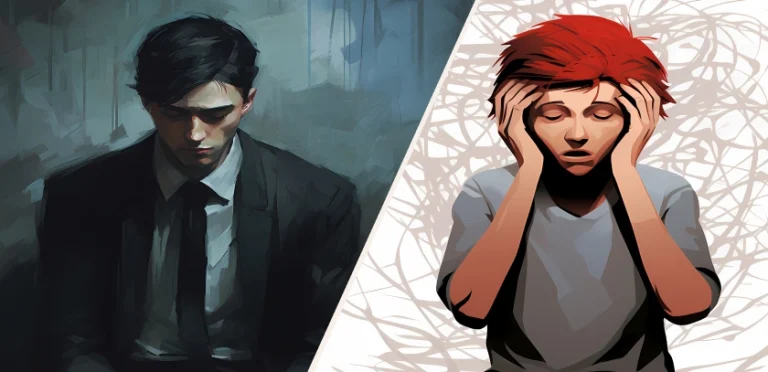
If you’ve ever wondered how to help someone with delusional disorder, you know it can be a challenging and delicate situation. Delusions, a symptom commonly associated with severe mental health disorders like schizophrenia and bipolar disorder, involve holding strong beliefs that are not based on reality. Research indicates that approximately 0.2-1.5% of the population will experience delusional disorder in their lifetime, with varying degrees of severity and impact on their daily lives.
Studies suggest that delusions often result from a complex interplay of genetic, neurobiological, and environmental factors. Understanding these dynamics is crucial for approaching the situation with empathy and informed strategies, aiming to guide the individual toward seeking professional help.
What is Delusional Disorder?
Delusional disorder is a serious mental illness characterized by the presence of persistent delusions, which are unshakable beliefs in something untrue or not based on reality. Unlike other psychotic disorders, individuals with delusional disorders often do not exhibit bizarre or odd behavior outside of their delusions and can appear quite normal in their day-to-day interactions.
Their ability to function in social, occupational, and other important areas of life can remain relatively intact, provided their delusions are not directly challenged or interfere with their roles. The delusional disorder can be categorized into various types, such as persecutory, grandiose, jealous, somatic, and erotomanic, each defined by the nature of the delusional content. In some cases, individuals may also experience related conditions such as anxiety disorders or major depressive disorder (MDD).
Despite these delusions, people with this disorder might not always recognize the need for help, making it a uniquely challenging condition to address.
What is the Difference Between Delusion and Psychosis?
Understanding the difference between delusion and psychosis is crucial for accurately identifying and addressing mental health issues. A delusion is a fixed, false belief that is resistant to reason or confrontation with actual fact.
Psychosis, on the other hand, is a broader term that encompasses a range of symptoms, including delusions, hallucinations, disorganized thinking, and impaired insight.
While delusions can occur as a part of psychosis, not all individuals experiencing psychosis will have delusions.
| Feature | Delusion | Psychosis |
| Definition | A fixed, false belief resistant to reason or facts | A broad syndrome involving delusions, hallucinations, and disorganized thinking |
| Scope | Specific false belief | Includes a range of symptoms |
| Symptom | Yes | May include delusions, but not always |
| Cognitive Impact | Specific to the delusional belief | Broader cognitive and perceptual disruption |
| Occurrence | Can be present without broader psychosis | Often includes delusions, among other symptoms |
Delusion vs. Hallucination
| Feature | Delusion | Hallucination |
| Definition | Fixed, false belief not based on reality | Perception of something that is not present |
| Nature | Cognitive belief | Sensory experience |
| Examples | Believing one has special powers or is being persecuted | Seeing, hearing, or feeling things that aren’t there |
| Awareness of Reality | May have insight into other aspects of reality | Usually occurs without awareness of its unreality |
| Common in | Delusional disorder, schizophrenia, bipolar disorder | Schizophrenia, severe depression, substance abuse |
Delusional Disorder vs. Schizophrenia
| Feature | Delusional Disorder | Schizophrenia |
| Core Symptoms | Persistent delusions | Delusions, hallucinations, disorganized thinking, negative symptoms |
| Functional Impact | Relatively intact outside delusional beliefs | Significant impairment in multiple areas of functioning |
| Onset Age | Typically, middle to late adulthood | Usually, late adolescence to early adulthood |
| Duration of Symptoms | It can be chronic but stable | Often chronic with potential for episodic relapses |
| Additional Symptoms | Generally lacks other psychotic symptoms | Includes a broader range of psychotic symptoms and cognitive deficits |
| Insight | Often maintains insight in areas outside of delusion | May have impaired insight across various domains |
Symptoms Associated with Delusional Disorder
Delusional disorder is characterized primarily by the presence of persistent delusions, but it can also be accompanied by a range of other symptoms that can impact an individual’s daily functioning.
While the delusions themselves are the defining feature, there are often additional psychological and behavioral symptoms that may arise as a result of the delusional beliefs. These symptoms can vary depending on the type of delusional disorder and the nature of the delusions.
- Non-bizarre Delusions: Beliefs that, while false, are plausible and could occur in real life (e.g., being followed loved by a famous person).
- Irritability or Anger: Frequent frustration or anger, especially when delusional beliefs are challenged.
- Mood Disturbances: Depression, anxiety, or other mood changes resulting from the distress caused by delusions.
- Social Isolation: Withdrawal from friends and family due to distrust or preoccupation with delusional beliefs.
- Functioning Impairment: Difficulty maintaining jobs, relationships, or daily routines due to delusional focus.
- Paranoia: Excessive suspicion and mistrust of others, often linked to persecutory delusions.
- Perseveration: Repeatedly discussing or focusing on the delusional topic despite a lack of interest or understanding from others.
Causes of Delusional Disorder
The causes of delusional disorder are complex and multifaceted, involving a combination of genetic, biological, and environmental factors. While the exact cause is not fully understood, research suggests that several key elements may contribute to the development of this condition. Understanding these potential causes of delusion can help in developing effective strategies for treatment and support.
Genetic Factors: A family history of delusional disorder or other mental health conditions may increase the risk.
Biological Factors: Abnormalities in brain regions that control perception and thinking, neurotransmitter imbalances (such as dopamine), and underlying medical conditions.
Psychological Factors: Personality traits like suspiciousness or heightened sensitivity, as well as low self-esteem, may predispose individuals to developing delusional beliefs.
Environmental Factors: Stressful life events, social isolation, or significant changes such as immigration or a major loss can trigger delusional disorder.
Substance Abuse: Use of drugs or alcohol can exacerbate or contribute to the onset of delusional symptoms.
Age and Gender: Although delusional disorder can affect anyone, it is more commonly diagnosed in middle to late life, and some types of delusions are more prevalent in specific genders (e.g., jealous delusions are more common in men).
How to Convince Someone with Psychosis to Get Help?
Convincing someone with psychosis to seek help can be incredibly challenging due to their altered perception of reality and potential mistrust of others. Approach the situation with empathy, patience, and a non-confrontational attitude. Start by expressing your concerns calmly and compassionately, focusing on specific behaviors or incidents that worry you rather than labeling their experiences as delusional or psychotic.
It’s crucial to listen actively and validate their feelings without agreeing with the delusions. Offer support and suggest seeking help as a way to understand and manage their experiences better rather than as a means of proving them wrong. Involving a trusted healthcare professional or a neutral third party can also be beneficial.
Encourage the individual to accompany you to an appointment, framing it as a way to improve their overall well-being and quality of life. Remember, building trust and maintaining a supportive relationship is key in guiding someone with psychosis toward accepting professional help. Professional treatment options like telepsychiatry can also make it easier for individuals to access care in a comfortable setting.
Management and Treatment
Managing and treating delusional disorder involves a multifaceted approach that combines medication, psychotherapy, and support systems to help the individual manage symptoms and improve their quality of life.
Early intervention is crucial, as it can prevent the disorder from worsening and aid in better long-term outcomes. Treatment plans are typically tailored to the individual’s specific needs, taking into account the nature and severity of their delusions, as well as any co-occurring mental health conditions.
Regular monitoring and adjustments to the treatment plan are essential to ensure its effectiveness and address any emerging issues.
Medication
Medications, particularly antipsychotics, are often the first line of treatment for delusional disorder. These drugs work by altering the effects of neurotransmitters in the brain, which can help reduce the intensity of delusional thoughts. Commonly prescribed antipsychotics include risperidone, olanzapine, and aripiprazole.
In some cases, antidepressants or anti-anxiety medications may also be used to address accompanying mood or anxiety symptoms. It’s important for individuals to work closely with their healthcare provider to find the most effective medication regimen with the fewest side effects.
Psychotherapy
Psychotherapy plays a critical role in the treatment of delusional disorder. Cognitive-behavioral therapy (CBT) is particularly effective, as it helps individuals challenge and modify their delusional beliefs and develop healthier thinking patterns.
Psychotherapy can also provide a safe space for individuals to explore the underlying issues contributing to their delusions and learn coping strategies to manage stress and anxiety. Family therapy is another valuable tool, helping family members understand the disorder and learn how to support their loved one effectively.
Support Systems
Having a strong support system is vital for individuals with delusional disorders. Support groups, whether in-person or online, can offer a sense of community and shared understanding, reducing feelings of isolation. Family and friends can provide emotional support, help monitor symptoms, and encourage adherence to treatment plans.
Educating loved ones about the disorder can foster empathy and patience, which are crucial for creating a supportive environment. Additionally, case managers or social workers can assist with coordinating care, connecting individuals to resources, and advocating for their needs.
Lifestyle Changes
Incorporating lifestyle changes can also support the management of delusional disorder. Regular exercise, a healthy diet, and adequate sleep can improve overall mental health and resilience.
Stress reduction techniques, such as mindfulness, meditation, or yoga, can help individuals manage anxiety and reduce the impact of stress on their symptoms.
Encouraging hobbies and social activities can also provide positive distractions and improve the individual’s overall well-being.
Long-term Monitoring and Adjustment
Managing delusional disorder is often a long-term process that requires ongoing monitoring and adjustments to the treatment plan. Regular follow-up appointments with healthcare providers are essential to track progress, make necessary changes to medications or therapy approaches, and address any new symptoms or concerns.
Staying engaged with treatment and maintaining open communication with the healthcare team can help individuals manage their condition more effectively and maintain a higher quality of life over time.
How to Handle a Psychosis Episode?
Handling a psychosis episode requires a calm and supportive approach to help manage the individual’s altered perceptions and behaviors effectively. Firstly, ensure the safety of both the person experiencing psychosis and those around them. Maintain a non-confrontational demeanor and avoid arguing or debating the reality of their delusions or hallucinations.
Instead, speak in a calm and reassuring tone, using simple and clear language to communicate. Help the person move to a quiet, familiar environment to reduce stimulation and potential triggers. Encourage them to focus on deep breathing or grounding techniques to help manage anxiety or distress. If the person is open to it, offer to contact a trusted family member or healthcare provider who can offer support or guidance.
Monitor the situation closely but respect their personal space and avoid overwhelming them with too many people or information. After the episode subsides, gently encourage them to seek professional help or follow up with their healthcare provider to discuss the episode and explore further treatment options.
The Bottom Line
Helping a delusional person seek professional help requires patience, empathy, and a supportive approach. By building trust, maintaining open communication, and gently guiding them towards professional resources, you can play a crucial role in their journey towards understanding and managing their condition.
Recognizing the complexities of delusional disorders and respecting the individual’s experiences are essential steps in fostering a positive environment for seeking help and achieving better mental health outcomes.
Frequently Asked Questions
1. Can you force someone to get mental help?
In most cases, you cannot force someone to get mental help unless they pose an immediate danger to themselves or others. Laws vary, but generally, treatment works best when the person agrees to it voluntarily.
2. What happens if delusional disorder goes untreated?
If left untreated, delusional disorder can become more severe over time. It may cause greater distress, affect daily functioning, damage relationships, and increase the risk of depression or isolation.
3. Are delusional people dangerous?
Not all delusional people are dangerous. Many live safely with support, but in some cases, certain delusions may lead to risky or aggressive behaviours, especially if untreated.
4. How to help someone with delusional disorder?
Offer calm support and listen without judgment. Encourage them to seek professional help, avoid challenging their beliefs directly, and be patient. Professional treatment like therapy or medication can make a big difference.
5. How to talk to someone who is delusional?
Speak respectfully and focus on their feelings instead of arguing about their delusions. Show empathy, stay calm, and gently guide them toward seeking professional treatment for proper care.




